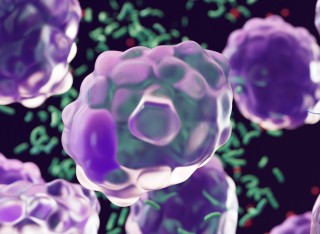
Dr Federica Orsenigo
Academic and research departments
Faculty of Health and Medical Sciences, School of Biosciences, Section of Immunology.About
Biography
I obtained a BSc in Biotechnologies in 2017 and a MSc in Industrial Biotechnologies in 2019 at University of Milano-Bicocca (Milan, Italy), joining a Molecular and Cellular Immunology lab for a 1-year internship during my MSc. My focus during my MSc internship was understanding calcium fluxes in innate immune cells and their impact on inflammatory processes and in pathologies such as rheumatoid arthritis.
I then obtained my dual PhD in Molecular and Translational Medicine at University of Milano-Bicocca (Milan, Italy) and in Immunology at University of Surrey, both awarded in 2023. During my PhD, I focused on human innate immune cells in the context of infections (SARS-CoV-2 and sepsis), in response to vaccine administration and in cancer (specifically non-small cell lung cancer and colorectal cancer). I specialised in in vitro models, flow cytometry, cell sorting, western blotting, single-cell RNA sequencing and tissue imaging.
I then joined Prof. Clare Mills’ lab at University of Surrey in 2023 as Research Fellow in Food and Molecular Immunology.
Affiliations and memberships
ResearchResearch interests
I joined Prof. Clare Mills’ lab as Research Fellow A in February 2023 on a project funded by the European Food Safety Authority (EFSA) (https://www.efsa.europa.eu/en) and focused on assessing in silico tools for allergenicity prediction in the context of food allergies.
For my new project, part of the Giant Leaps EU project (https://giantleaps.eu/), my research interest is to develop new approaches for allergenicity risk assessment of innovative/novel proteins. This is being realised through developing in vitro methods, including the use of human immune cell models, for assessing allergenic potential of alternative proteins, and through linking the readouts of the cell models with clinical phenotypes and HLA genotypes of food allergic patients.
Research interests
I joined Prof. Clare Mills’ lab as Research Fellow A in February 2023 on a project funded by the European Food Safety Authority (EFSA) (https://www.efsa.europa.eu/en) and focused on assessing in silico tools for allergenicity prediction in the context of food allergies.
For my new project, part of the Giant Leaps EU project (https://giantleaps.eu/), my research interest is to develop new approaches for allergenicity risk assessment of innovative/novel proteins. This is being realised through developing in vitro methods, including the use of human immune cell models, for assessing allergenic potential of alternative proteins, and through linking the readouts of the cell models with clinical phenotypes and HLA genotypes of food allergic patients.
Supervision
Postgraduate research supervision
Tutor to several BSc, MSc and PhD students at University of Milan-Bicocca and University of Surrey (2017-current).
Teaching
- Teacher during Training Course "Allergenicity risk assessment of innovative proteins in food and feed" delivered for the Scientific Officers working at the European Food Safety Authority (EFSA)(Italy, 2025).
- Teaching assistant in "R and data handling" (BMS1066, BMS1067, BMS2083) at University of Surrey (UK) (2025).
- Guest speaker in Food Technology and Safety (BMS3070) module at University of Surrey (UK) (2025).
- Assistant Lecturer in Food Allergy and Intolerances (BMSM005) module at University of Surrey (UK) (2024).
- Assistant Lecturer in Advanced Immunology (BMS3102) module at University of Surrey (UK) (2023-2024).
- Demonstrator in Immunology, Microbiology, Biochemistry, Virology and Cell Biology practical sessions at University of Surrey (UK) (2020-2023).
Publications
Seed storage globulins are amongst the first proteins to be described and form the major seed storage protein in dicotyledonous plants. They are characterized by a bi-cupin domain and form two main classes, the hexameric 11S and the trimeric 7S seed storage globulins. This article summarizes the sequences, structures, and relationships between allergenic seed storage globulins prolamins. Their abundance and widespread occurrence mean they have been identified as allergens in many legumes, tree nuts and nut-like seeds as well as oil seeds. Globulins from phylogenetically related species, such as walnut and pecan, cashew, and pistachio, frequently show IgE cross-reactivity.
